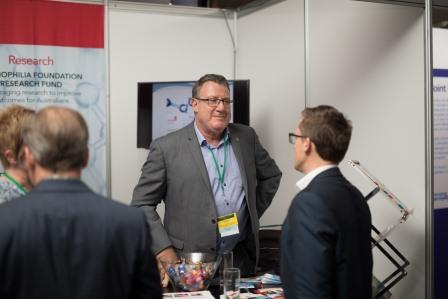Gavin Finkelstein spoke with Suzanne O'Callaghan from HFA about his experiences at the Conference
Gavin Finkelstein is President, Haemophilia Foundation Australia

Suzanne: What was your overall impression of the conference?
Gavin: It seemed to me that this Conference had something new and interesting for everyone who attended. The feeling was great. The venue lent itself to everyone engaging with each other and they really enjoyed that opportunity. Everyone was very excited and there was a real buzz. The theme of the Conference – Challenging the status quo – and the timing, and the topics and the way they were presented were all spot on.
Because there are now so many new types of treatments, and different types of treatments – bypassing agents, extended half-life treatments, gene therapy, to name a few – there is hope that treatment will be more precisely targeted at individual patients. Managing people’s expectations will be important, and not just about whether there will be government-subsidised access to these new treatments. Not every treatment that is available is going to be suitable for every person: it’s about targeting the right treatment to the right person.
Suzanne: Were there any sessions that stood out for you?
Gavin: I thought the ultrasound session was particularly good. For me it was the practicality – to see how it could be used clinically as a way to monitor joint deterioration over time and to take the opportunity to prevent further joint damage. Rob Russo demonstrated the ultrasound live on both a patient and a physiotherapist who volunteered to be on the stage. It was very visual: both the patient and the clinician share the diagnostic experience and I think seeing the evidence of the joint changes really hits home.
This to me is like the experience with MyABDR. You record your information into the system and you can track the details of your bleeds and treatments. With the graphs you can see for yourself the implications of treatments and bleeds. It makes it a lot more relevant to the patient and you can understand what is involved in your treatment regimen, what happens when you miss treatment and why it is so important to be compliant. It makes it a shared discussion about treatment and care between the patient and the clinician and has a two-way benefit. If you want a healthy and long life, you need to take some responsibility for managing yourself.
The happiness session with Dr Happy was also very good – enjoyable for everyone and gave some realistic options to pursue.
Suzanne: What was your take home message from the conference?
Gavin: There are so many things happening across the board and a lot of it is really positive: there is gene therapy and other new treatment products, and for the first time we as a community are getting older. Our job isn’t done. We need to make sure there is access to best practice treatment and care. This isn’t just about access to the new treatments; if we are going to have best practice clinical care across Australia into the future, all HTCs need to be well-resourced.
There is a lot of work to do. It was great to see a new generation of young adults with bleeding disorders who are enthusiastic and doing well on treatment. They are now stepping up and wanting to be involved and take the advocacy work into the future – into the new world of the new treatments. And from my perspective this is really appropriate. My generation is getting older now and we have lived through a missing generation with HIV and hepatitis C that wasn’t there to step into the breach with this work – it has been really hard to maintain the advocacy and representation through those losses and being tired and ill. This is a new world now and it is terrific to see young capable people who are prepared to take their life and their future into their hands.
Haemophilia Foundation Australia acknowledges the Traditional Owners and Custodians of Country throughout Australia, the land, waters and community where we walk, live, meet and work. We pay our respects to Elders past and present and extend that respect to all Aboriginal and Torres Strait Islander peoples.
Sign up for the latest news, events and our free National Haemophilia magazine